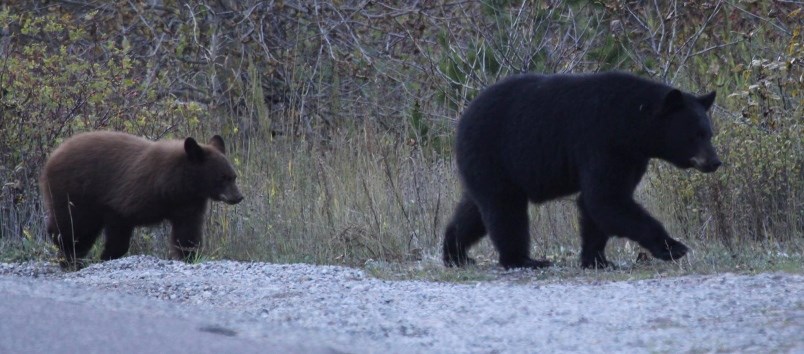The Saskatchewan Ministry of Environment is urging people to be bear aware this summer.
Kevin Harrison, a conservation officer with the Ministry, say that there has been quite a few incidences in the south east of Saskatchewan.
“From April 1st, 2020 to today, there has been 67 occurrences in the Yorkton, Duck Mountain, Preeceville, Melville, Moose Mountain area,” says Harrison.
This would explain why Cory Woywada photographed a bear walking around the Rocanville School.
“I’m new to this area and this was the first time I ever seen a bear in town.”
Woyawada is not a stranger to bear sightings having just moved from Strathclair, Manitoba, he would see bears in the farm yard.
The reason seems to be that we had a late spring this year.
“The bears’ food sources of berries, grubs and shrubs (became available) a little later than usual. They live by their stomachs and if they can’t find their usual food sources they will find something else,” Harrison continues.
The healthy black bear population of Saskatchewan is out and trying to establish new territory, so it is not unusual to see bears in the wild or exploring communities and camp grounds this time of year. This is why the government is asking people to practice vigilance when it comes to proper food storage, cooking methods and garbage handling. These actions are essential for safe camping in bear country. If these guidelines are followed, chances are that bear incidences will decline.
“When the berries start coming out we will be seeing less and less (bears)” says Harrison.
Like Manitoba, Saskatchewan doesn’t keep a record of the Black bear population, but Harrison is sure that there has been an increase in bears this year.
“Our population of bears are on the healthy side. The spike due to Covid could be because hunters could not hunt this year,” Harrison explains.
There are only two bear hunting seasons in Saskatchewan and with the one already over and the government not planning on extending hunting into the summer, It is safe to say that being bear aware is a good idea.
The press release goes on to say that “When bears start to associate their food with humans, they become a nuisance and a public safety concern.”
Some government tips that the Ministry of Environment has laid out include:
• Store garbage in a secure building or buy a bear-resistant container. Only put the bin out on the morning of collection.
• Avoid leaving pet food accessible to wildlife.
• Only use bird feeders in the winter when bears are hibernating and natural bird food is limited.
• Properly clean and store barbecue grills after each use.
Following these guidelines, will help ensure that our healthy Black bear population lose interest in human populated areas and go find food elsewhere.
The ministry also asks that “if a bear is repeatedly doing damage in your community, or you have an aggressive encounter with a bear, contact your local Ministry of Environment office or call the Turn in Poachers and Polluters (TIPP) line at 1-800-667-7561 or from your SaskTel cell phone at #5555”.
Additional information about bear safety is available at www.saskatchewan.ca.


.png;w=120;h=80;mode=crop)

